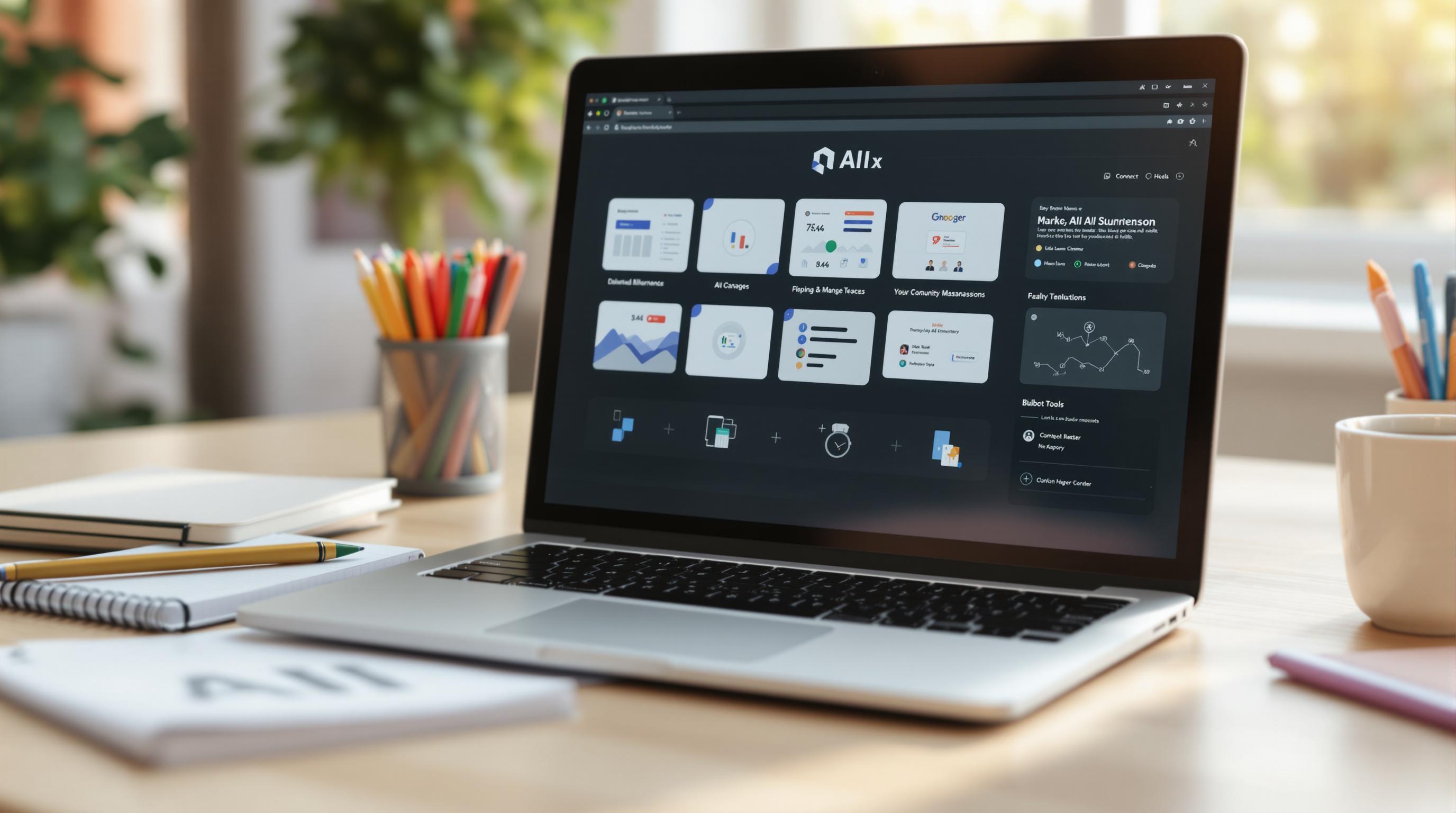AI tools are transforming mental health care in 2025 by providing accessible, 24/7 support. With over 970 million people globally affected by mental health disorders, these apps bridge gaps in traditional care by offering immediate assistance, personalized guidance, and tools for emotional well-being. Here’s a quick overview of seven standout apps:
- Wysa: Offers AI chat support using CBT, mindfulness, and meditation techniques, with privacy-focused interactions.
- Youper: A smart mental health assistant providing CBT-based chat, personalized evaluations, and progress tracking.
- Woebot: A CBT-based bot for mood tracking, mindfulness, and emotional resilience.
- MindDoc: Focuses on mental health monitoring with symptom tracking and personalized insights.
- Earkick: Analyzes voice data and biometrics to detect stress and provide real-time emotional support.
- Rosebud: Enhances journaling with AI-driven emotional insights and therapeutic prompts.
- AI Apps Directory: A hub for finding 98 AI-powered mental health tools tailored to specific needs.
While these tools improve access and convenience, they complement - not replace - professional mental health care. AI’s role is growing, but human interaction remains essential for accurate diagnoses and treatment.
How Mental Health Apps Use AI to Personalize Treatments
1. Wysa: AI Chat Support for Mental Health

Wysa is an AI-driven mental health platform trusted by over 6 million users across 95 countries. It combines proven therapeutic techniques with 24/7 availability, offering a convenient way to support emotional well-being. With 2 million CBT sessions and over 500 million conversations under its belt, Wysa has earned a 91% positive feedback rate from its users.
Here’s what makes Wysa stand out:
- Privacy & Security: Personal information is deleted within 24 hours, ensuring secure and anonymous interactions.
- Evidence-Based Practices: Offers tools rooted in CBT, DBT, mindfulness, guided meditation, and yoga techniques.
- Professional Validation: Rated 93% overall by ORCHA (the NHS's digital health app evaluation agency) and scored 100% for clinical assurance.
Wysa's tools are designed for everyday mental health management. The platform emphasizes collaboration, stating, "The future of mental healthcare isn't AI versus therapists. It's AI and therapists working together".
For structured support, Wysa includes the Copilot platform, which helps users manage stress, improve sleep, and regulate emotions. It also features an SOS option to connect users with local and national crisis helplines when immediate help is needed.
Important Note: Wysa is meant for general mental health support and is not a substitute for crisis intervention or medical emergencies.
With a 4.6/5 rating from 150,000 reviews on the Google Play Store, Wysa blends AI technology with therapeutic techniques to provide a reliable system for managing emotional health. It’s a practical tool for anyone looking to enhance their mental well-being.
2. Youper: Smart Mental Health Assistant

Youper is a mental health assistant trusted by over 2.5 million users. Backed by Stanford University research, the app has shown that more than 80% of users feel better after using it.
Here’s what makes Youper stand out:
- CBT-Based Conversations: The app uses Cognitive Behavioral Therapy (CBT) techniques in natural, chat-based interactions to make therapeutic support easy to access.
- Personalized Evaluations: It provides customized assessments and tracks your progress over time.
- Instant Support: Get real-time emotional support through its chat feature whenever you need it.
- Professional Use: Healthcare providers can integrate Youper into their treatment plans for more effective care.
These features have led to real results. About 83% of users report feeling better, and the app has facilitated over 10 million therapeutic conversations.
Youper also uses customized large language models to prioritize safety, clinical accuracy, and privacy. Recognized by the Journal of the American Medical Association as a top digital solution for managing anxiety and depression, it’s a trusted tool for emotional well-being.
For users working with mental health professionals, Youper allows easy data sharing, so your care team can stay updated on your progress.
3. Woebot: CBT-Based Mental Health Bot

Launched in 2017 by clinical research psychologist Dr. Alison Darcy, Woebot is a 24/7 mental health support app designed for smartphones and tablets. By combining clinical knowledge with artificial intelligence, it delivers tailored mental health care.
Woebot takes a unique approach to mental wellness, offering tools backed by research:
| Feature | Purpose | How It Helps |
|---|---|---|
| Mood Tracking | Tracks daily emotional states | Identifies patterns and triggers |
| Progress Reflection | Reviews personal improvement | Shows measurable progress |
| Gratitude Journaling | Encourages positive thinking | Builds emotional resilience |
| Mindfulness Practice | Promotes present-moment awareness | Eases stress and anxiety |
These features highlight Woebot's focus on providing research-backed mental health resources. The app operates as a fully automated tool, enabling users to handle mood and behavior challenges effectively.
"Empathy and rigor are central to Woebot Health's approach. We aim to help people get to know themselves better by forming meaningful relationships", says Dr. Alison Darcy, founder of Woebot Health.
Woebot offers structured check-ins, practical CBT techniques, and on-demand support to help users manage depression and anxiety.
With Woebot, users can:
- Track emotional health with regular check-ins
- Practice CBT techniques tailored to their needs
- Develop long-term habits for mental wellness
- Access immediate support whenever required
Woebot’s ability to adjust its guidance to individual needs reflects the growing demand for accessible mental health tools.
sbb-itb-212c9ea
4. MindDoc: Mental Health Monitoring

MindDoc is a mental health monitoring app trusted by over 3 million users. Designed by clinical psychologists and researchers, this AI-powered tool helps users track and manage their emotional well-being. Its structured, data-focused approach delivers insights that users can act on.
Here’s what MindDoc offers:
| Feature | Purpose | How It Helps |
|---|---|---|
| Symptom Tracking | Logs mental health indicators in real time | Helps users spot emotional patterns |
| Personalized Assessment | Uses AI to analyze emotional health | Delivers insights tailored to the user |
| Healthcare Integration | Creates shareable progress reports | Supports communication with professionals |
MindDoc is designed to monitor conditions like depression, anxiety, insomnia, and eating disorders. It prioritizes data security with ISO 27001 certification and GDPR compliance.
The app’s AI analyzes user inputs to generate daily insights, detailed progress reports, and personalized resource suggestions. With a 4.7/5 rating on the Apple App Store from over 26,000 reviews, it’s clear that users value its ability to turn logged data into actionable tools:
- Daily Insights: Offers feedback on emotional patterns and symptoms
- Progress Reports: Tracks trends in emotional health over time
- Resource Recommendations: Suggests tools and strategies tailored to individual needs
MindDoc also incorporates Cognitive Behavioral Therapy (CBT) principles, providing users with therapeutic recommendations that feel personal and accessible. By tracking long-term patterns, the app helps users understand their emotional journey and pinpoint potential triggers.
While some features require a paid subscription, many users appreciate how it supports regular mental health check-ins and emotional tracking. Combining clinical expertise with advanced technology, MindDoc offers a reliable way to monitor mental health.
5. Earkick: Audio-Based Mental Health Support

Earkick is an AI-driven platform that analyzes voice recordings and biometric data to offer real-time emotional support. By recording voice memos, users can monitor their mood, stress levels, and other symptoms while receiving tailored insights to help manage anxiety and improve mental health.
Key Features of Earkick
| Feature | Purpose | Benefit |
|---|---|---|
| Voice Memo Analysis | Detects mood and stress patterns | Tracks emotions instantly |
| Apple Watch Integration | Monitors heart rate during activities | Evaluates relaxation success |
| AI Therapy Chatbot | Offers immediate support | Accessible 24/7 |
| Personalized Audio Content | Provides relaxation techniques | Adjusts to specific needs |
Research highlights a 57% drop in anxiety and noticeable mood improvements within weeks for users. This makes it especially helpful for individuals who face challenges accessing traditional mental health care.
Earkick’s AI system can:
- Analyze voice data to identify emotional trends
- Pinpoint stress triggers through daily reports
- Suggest effective coping methods in real-time
- Assess the impact of breathing exercises
"A gift for rural residents. I live in a rural area and therapy is hard to access. I've been on a two‐year waitlist to see a therapist. This has been a godsend - very intuitive and helpful. Thank you so much!" - Herbert Bay, CEO at Earkick
Designed for short, frequent sessions - usually around 10 minutes - Earkick works alongside traditional therapy, keeping users engaged between professional appointments.
The app’s machine learning technology provides a detailed view of mental health by examining:
- Voice patterns and emotional signals
- Daily activity and routines
- Stress triggers and responses
- Mood changes over time
To get the most out of Earkick, users are encouraged to interact with the platform multiple times a day. This consistent engagement ensures it serves as an ongoing support system, not just a tool for moments of crisis. Earkick’s approach continues to expand the role of AI in mental health support in 2025.
6. Rosebud: Mental Health Journaling Assistant

Rosebud uses AI to transform journaling into a tool for mental well-being. It learns from user entries to offer tailored guidance, helping people process their thoughts and track emotional progress effectively.
Key Features and Benefits
| Feature | Purpose | Impact |
|---|---|---|
| Interactive Daily Diary | Guided self-reflection in real time | Clarifies thoughts and emotions |
| Smart Pattern Recognition | Detects emotional trends | Highlights behavioral patterns |
| Voice Journaling | Available in 20 languages | Makes journaling more accessible |
| Weekly Mental Health Analysis | Tracks progress over time | Offers actionable feedback |
| Expert-Crafted Experiences | Uses therapeutic frameworks (CBT, ACT, IFS) | Provides evidence-based support |
These features deliver real results. Data shows that after just one week, 69% of users managed anxiety better, and 68% saw improvements in anger control. A broader survey of 1,300 users found that 63% experienced reduced depression symptoms within seven days.
Experts also back Rosebud's effectiveness. Sky Kershner, LPC, LCSW, and Assistant Professor of Psychiatry, shares: "I recommend it to clients to help them through the week, and to students to learn how to give empathy".
Personalized Mental Health Support
Rosebud offers features like:
- Morning intention setting and evening reflection prompts
- Dream journal interpretation
- "Go Deeper" questions for exploring emotions
- Customizable AI personality settings
- Weekly mental health summaries
Its ability to uncover emotional triggers and patterns stands out. IFS Therapist David Coates says: "I always recommend Rosebud as something to use between sessions. It is mind-blowingly effective".
"Rosebud has changed my experience with journaling and self-reflection in profound ways. This AI experience mirrors my approach to self-reflection and has become a powerful self-coach. It's truly incredible how quickly it's become an indispensable tool." – Jonathan Anders
With a 4.9 out of 5 rating on the App Store from 719 reviews, Rosebud clearly resonates with users. By blending traditional journaling with AI-driven insights, it provides a practical way to improve mental health.
Using the app consistently for morning and evening reflections allows the AI to better understand emotional patterns, leading to more precise and helpful support over time.
7. AI Apps: Mental Health Tools Directory
AI Apps offers more than just app reviews - it maintains a directory of 98 AI-powered mental health tools to meet a variety of well-being needs. The directory simplifies the search for support by organizing tools into key categories.
Directory Categories and Features
| Category | Tool Types | Key Features |
|---|---|---|
| Therapy Support | AI Chatbots, Virtual Therapists | Always available, quick assistance |
| Emotional Tracking | Mood Monitors, Journal Apps | Tracks patterns, monitors progress |
| Crisis Support | Emergency Response, Hotline Assistants | Immediate help, private support |
| Mindfulness | Meditation Guides, Breathing Exercises | Tailored practices, stress relief |
| Professional Tools | Session Analysis, Transcription | Automated notes, improved therapy |
A strong emphasis on user privacy sets this directory apart. For instance, PSY, one of the highlighted providers, notes that "AI provides objective, non-judgmental responses, creating a safe and supportive environment".
How AI Apps Simplifies Tool Selection
AI Apps guides users in building a personalized mental health toolkit by offering:
- Filters to match tools with specific mental health concerns
- A thorough verification process for listed apps
- Recommendations based on user feedback and data
- Regular updates to reflect advancements in mental health tech
The curation process ensures each tool meets standards for AI functionality, privacy, and therapeutic value.
Features for Personalized Support
Users benefit from features like 24/7 AI chat support, tailored tool suggestions, frequent updates, and easy-to-follow integration guides. These services are designed to fit seamlessly into your daily mental health routine.
Conclusion
AI tools are making mental health support more accessible. For instance, Wysa has shown strong results, with 91% of users reporting positive outcomes.
The Role of AI in Mental Health Support
AI is particularly helpful for providing instant, 24/7 assistance, which can be a game-changer for people dealing with time constraints or living in remote areas. Its nonjudgmental nature also helps users feel more comfortable opening up. These features highlight AI's growing role in mental health care.
Current Limitations and Professional Care
Despite its advantages, AI has clear limits, especially in areas like suicide risk prediction. This underscores its role as a tool to complement, not replace, professional mental health services.
"With the patient's consent, AI can be used to listen in on a [therapy] session, and make suggestions if a therapist misses an opportunity to deliver an intervention with a high probability of success." – Dr. Chris Mosunic, Chief Clinical Officer at Calm
Future Developments
AI is expected to bring new advancements to mental health care, including:
- Wearables that monitor mental health in real time
- Emotion analysis during therapy sessions
- Better predictive tools for mental health issues
- Data-driven approaches to treatment planning
While these innovations are promising, human interaction remains essential in mental health care. Research continues to show how critical the human element is for accurate diagnoses and effective treatment. The goal is to use AI to broaden access while maintaining the importance of personal connections in therapy.



